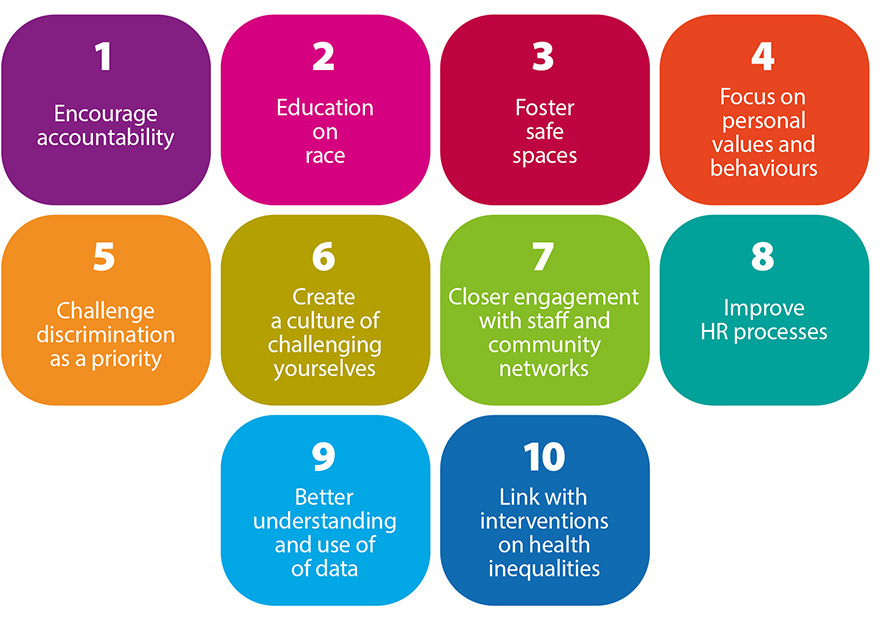Areas of most and least progress
- Only 4% of respondents felt that race equality is fully embedded as a core part of their boards business.
- All respondents we spoke to described their ambition to listen more closely to staff about their experiences: 85% said that they have made the most progress in increased leadership focus on staff networks.
- 63% said they had progressed in building a more diverse board, and most leaders agreed this was not only a key priority for the board but a personal priority. However, just less than a third (32%) have incorporated race equality into their board assurance framework.
- Leaders recognised the need for greater support for their workforce, particularly for those experiencing discrimination. 77% said that they have made progress on actions to improve workforce wellbeing. However, only 22% have made progress in actions to retain ethnic minority staff. Even fewer (6%) felt they had made progress on procurement, which includes monitoring all suppliers by race and seeking commitment from service providers on race equality.
Challenges
- One of the biggest reported challenges for leaders is having the time and capacity to make an impact on race equality. This is particularly the case if they experience an uphill struggle in persuading other board members that race equality should be a priority. Some leaders describe having to subsume a focus on race equality within other topics to stop boards becoming disinterested.
- Attracting diverse talent, particularly where local communities are less diverse, is described as a challenge. Few trusts described proactively developing their ethnic minority talent pipeline in response.
- Engaging middle management in meaningful change was described as a key barrier.
- Ethnic minority leaders face a double burden of experiencing discrimination whilst also feeling pressure to lead on race, especially when their white peers are not comfortable playing a leadership role. A key challenge from their experience is how to foster a sense of shared responsibility and ownership.
- Some highlighted their boards’ frustration that they were yet to see evidence of real change. They wanted to know about the evidence base for high impact interventions that had worked in trusts like theirs.
Good practice
Examples of good practice given by responders revolved around the following 10 areas:

NHS Providers support offer
- NHS Providers was perceived as being "late to the party". Trust leaders also highlighted the lack of diversity of staff at senior level as well as among those delivering NHS Provider sessions. One ethnic minority leader noted the lack of conversation and engagement when race is mentioned at NHS Provider member meetings in comparison to other topics.
- Members felt NHS Providers could make more use of its agency and influencing, challenging national bodies and regulators to ensure race equality is genuinely prioritised. There was also an opportunity for NHS Providers to use its convening power to share learning and good practice, and to genuinely embed a focus on race equality through its existing support offer.
- Almost three out of four respondents (72%) said that evidence-based case studies of how individual trusts have made progress would help their board accelerate their pace of change, followed by two thirds (67%) who wanted NHS Providers to support their learning from best practice in other sectors.
What national bodies could do differently
- Trusts said that the national bodies could help their board take effective action on race equality by providing challenge, sharing best practice resources, and holding boards to account. Chairs in particular felt that the national bodies must lead by example and promote national work on race equality.